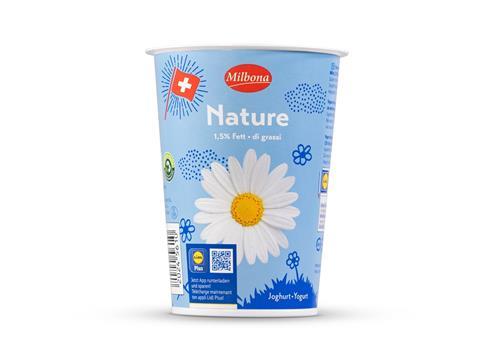
Molkerei Forster is adopting Greiner Packaging’s self-separating cups for its 500g Milbona brand natural yoghurts sold at Lidl Schweiz – aiming for recovery in separate recycling streams in the future.
Reportedly, the K3 r100 cups do not require human intervention for their plastic bodies and cardboard wrap to separate from each other. Instead, they are said to come apart under mechanical pressure.
As sorting and recycling technologies continue to develop in Switzerland, the companies anticipate that the cardboard and plastic elements can one day be identified, separated, and recycled in their respective streams via harmonized sorting flows. Until that point, the components must be separated manually and sent to local disposal systems.
Nevertheless, K3 r100 is described as a ‘future-proof design’ and hopes to stand Molkerei Forster in good stead to embrace technological upgrades when they take place. All three companies also underline their own commitment to sustainable progress.
“Without good partners like Molkerei Forster, innovations such as our K3 r100 would not be
Possible,” explains Antonios Kampouris, sales director at Greiner Packaging Switzerland. “Before we brought the cup to market, we perfected it in numerous filling tests – including on Molkerei Forster’s systems.
“Because having a good idea is one thing, checking it for marketability is another. This is only possible in collaboration with our customers.”
“We have set ourselves the goal of focusing on sustainability,” says Molkerei Forster’s founder, Markus Forster. “This begins with the raw materials used and continues through our production processes to product packaging and beyond. With K3 r100 we are taking another important step towards a sustainable future.”
Andreas Zufelde, chief commercial officer at Lidl Schweiz, adds: “We have a long-standing and successful partnership. We are pleased to be taking another joint step forward in the packaging sector.
“By introducing the innovative yogurt packaging, we are once again underlining our commitment to recycling sustainability and design.”
Another redesign for yoghurt came earlier this year in a collaboration between Plastiques Venthenat, Amcor, Olga, Cedap, and Arcil-Synerlink. Their form-fill-seal pot sought full recyclability and offers 98.5% polystyrene content – and the solution reached the finals of the Sustainability Awards 2023 under the pre-commercialized Recyclable Packaging category.
Netstal has also unveiled its lightweight, thin-wall, mono-material injection compression moulded cup for dairy products; and a collaboration between TotalEnergies Corbion and COEXPAN has resulted in a bio-based cup made with recycled PLA.
If you liked this article, you might also enjoy:
The L’Oréal approach to packaging sustainability
The way we talk about plastic needs to change – here’s how to get it right
What steps is Apple taking to make its packaging more sustainable?














No comments yet